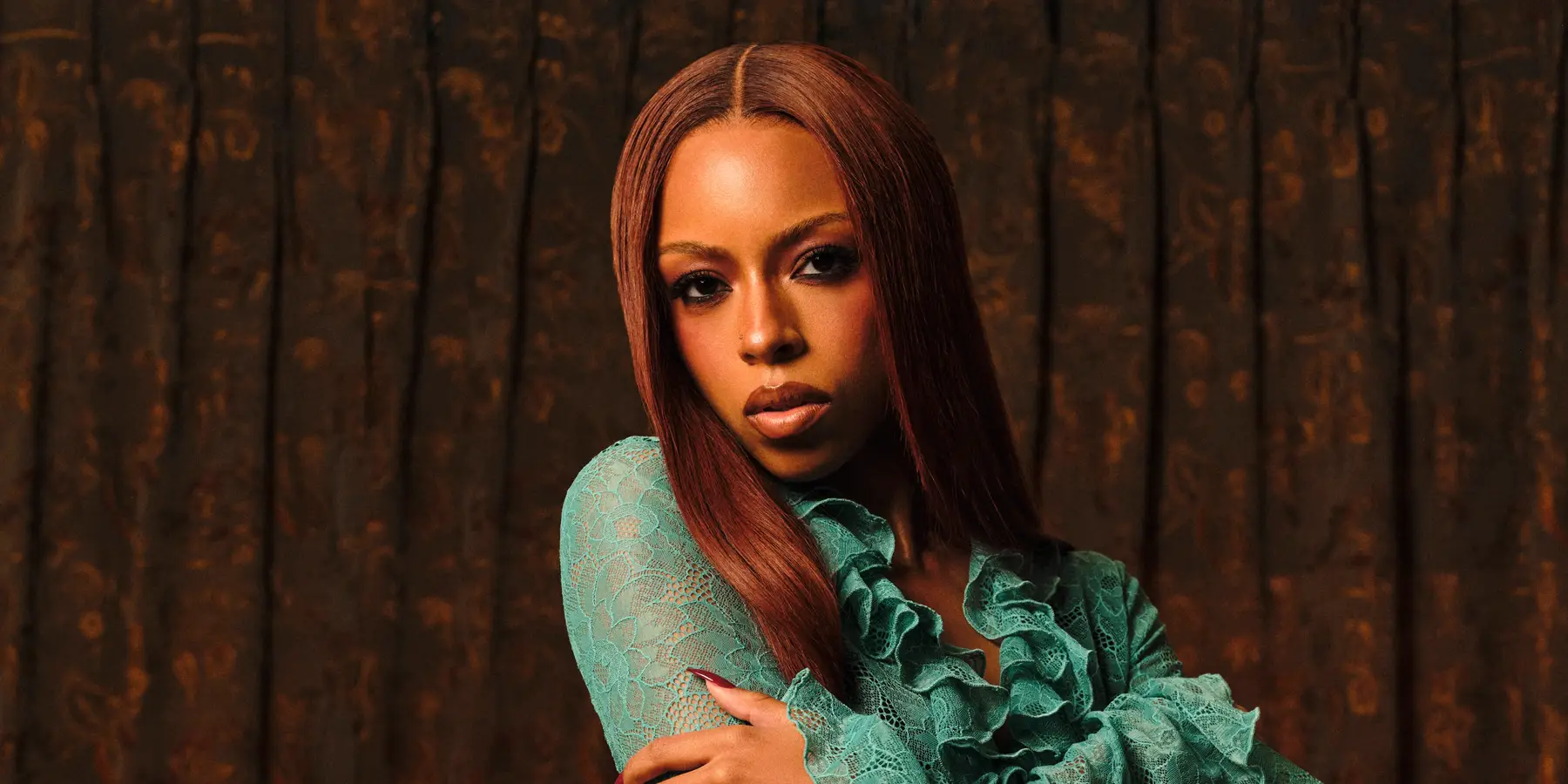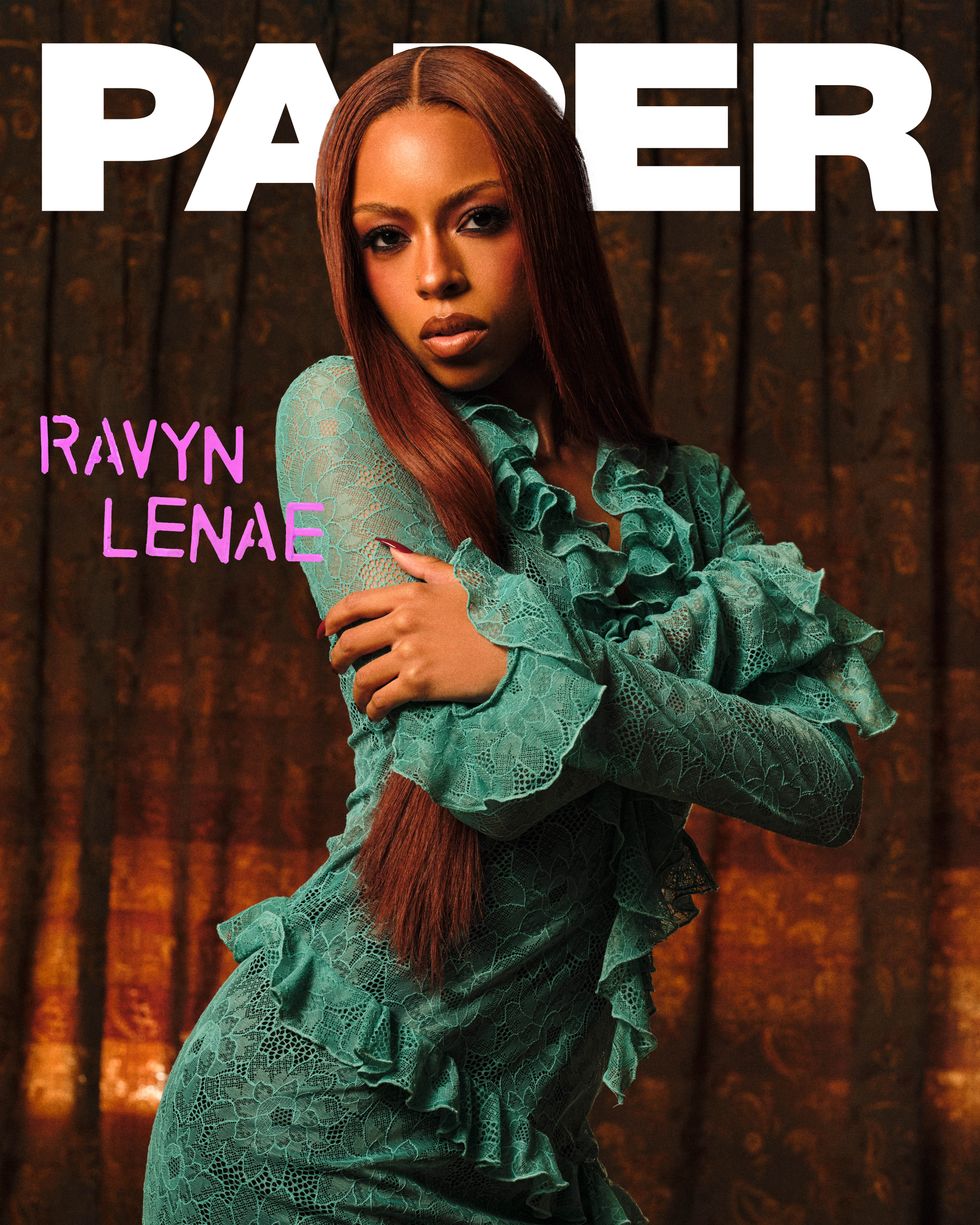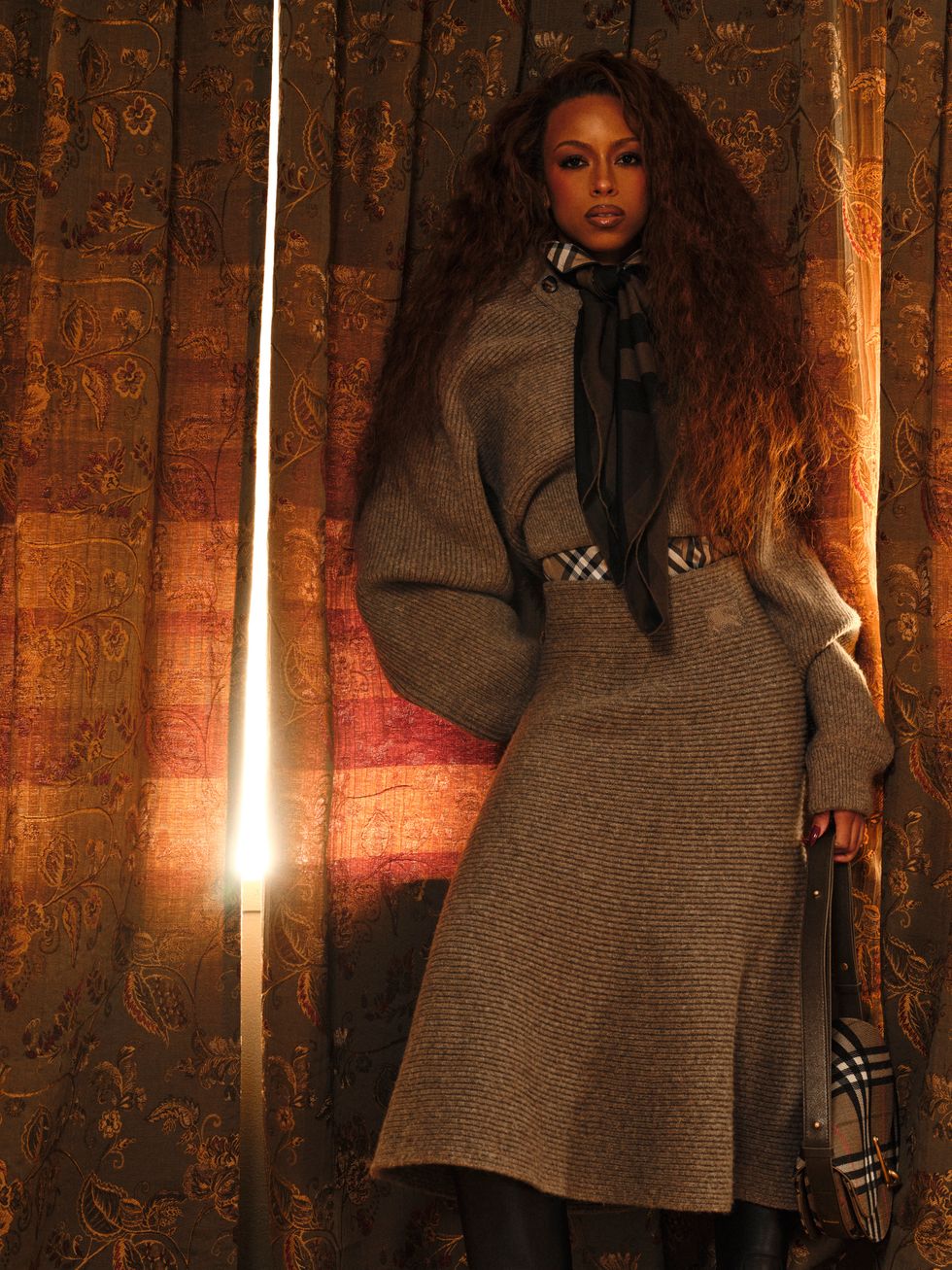
Ravyn Lenae Enjoys the View
Story by Erica Campbell / Photography by Richie Talboy / Styling by Angelina Cantú / Makeup by Matthew Fishman / Hair by Jacob Aaron Dillon / Nails by Kimmie Kyees / Set design by Allegra Peyton

When Ravyn Lenae says that she’s from Chicago, she doesn’t just mean the location. She smiles as she discusses the food, her family, the music. “When I was coming up and seeing artists like Chance the Rapper, Noname, Saba, Via Rosa, McJenkins — there were so many people I could look up to and see the possibilities,” she says of her windy city upbringing. “That type of representation is so important for younger people coming up... just to see that it’s possible.”
For Lenae, those possibilities were endless. In 2022, she released her debut album Hypnos to critical acclaim. Pitchfork named it “Best New Music,” noting Lenae’s ability to sonically swim through R&B history. At the time of its release, she’d already opened for Noname and SZA and released a 2018 EP, Crush, produced by Steve Lacy. Some called Hypnos a reintroduction to a singer who had originally made waves in Chicago’s music scene in 2015 — but her follow-up, 2024’s Bird’s Eye, was the first time she felt like she walked into the studio with the goal of presenting her full creative and vulnerable self to the world. “Without thinking about money, career, numbers or anything like that, I had to think, ‘What are these simple things about Ravyn that make me excited about myself?’” she says.

Clothing: Burberry
Lenae worked with Grammy Award-winning producer Dahi (Kendick Lamar, SZA, Steve Lacy) and tapped Childish Gambino and Ty Dolla $ign for features on Bird’s Eye. She also widened her genre and vocal reach — allowing herself to delve into the full range of music she’d grown up on, from pop to R&B, soul and indie rock. “I knew that if I wanted to make an album that felt true and honest and represented where I was, I had to go back in time to those really basic parts of me,” Lenae says. She explains that everything from the clothes she used to borrow from her aunt to the sound of plantains sizzling on the stove in her childhood home to a desire to be open and courageous in the topics she shared were all inspiration for the album. “Those really simple things about me that make me cool. I had to cling to that and also not be scared of revealing those tricky parts of my life or things that I wanted to stay hidden or didn’t want to get into,” she says. “It came down to thinking about, ‘What were those things that made me tick back then?’” In “One Wish,” she writes about the complex relationship she has with her father and him not showing up for her 10th birthday. With “Love Is Blind,” she outlines a story of the end of a toxic relationship as she sings, “How do you love me if you leave me behind?” If her goal was to create an album of songs fans could cry and dance to at the same time, she nailed it.
The album’s biggest moment — and perhaps strongest example of Lenae’s ability to spin tales of complicated emotions into pop songs — is “Love Me Not.” The Bird’s Eye lead single, released in May 2024, shows off her penchant for classic sounds, the depth of her ethereal vocals and her love of songs that “feel sad but happy and uplifting.” With its mesmerizing, soulful sounds and relatable lyrics of being pulled in then pushed out by love, “Love Me Not” has slowly climbed the charts, more recently becoming viral on TikTok and ultimately sitting at No. 12 on the Billboard Hot 100 chart. “There’s something chanty about it, too, and anthemic about it. It had all the qualities for me to be a perfect pop song,” Lenae says of the hit. “I played it for my team and we all felt the same jittery feeling around it. I’m happy to see that everybody agrees.” Still, she feels like this is only the beginning. “I’m also thinking beyond ‘Love Me Not’ and this moment, and thinking about the artist I want to continue to grow into and the music I want to continue to make,” she says.“This has really only lit more fire under me and created more excitement around what's next.”
Following a sold-out headlining tour, Lenae is preparing to hit the road again, opening for Sabrina Carpenter and Reneé Rapp. But before that, the now Los Angeles-based artist is coming home for a hometown show in Grant Park for Chicago’s most famous festival, Lollapalooza. “I love Chicago,” she says. “There’s a sense of camaraderie that a lot of places don’t have. I remember, super early, when I was putting out music, they would come to my shows and the studio and having that type of community is so special and valuable, especially in those early stages.”
I know you’re performing at your hometown fest this summer. Did you ever go to Lollapalooza as a fan?
Yeah, I went when I was 17. Smino was performing. I remember getting so drunk out of my mind and doing edibles. So that’s my idea of Lollapalooza. It’s kind of a blur. To this day, my mom thinks I got food poisoning. She’ll read this and find out I was actually towed up.
Where were you at emotionally and mentally before entering the studio to make Bird’s Eye?
Around making Bird’s Eye, I underwent an internal transformation. I felt, from Hypnos to Bird’s Eye, there was so much cleansing that happened to me, spiritually. I felt inspired going into the studio. In the past, especially during COVID and moving from Chicago to LA, life transitions were hard for me. So while making Hypnos, I wore all of that on me. It was hard for me to see the finish line and feel inspired about where I was and what I was doing. The reception of Hypnos pushed me into the mind frame of Bird’s Eye. I knew that if I wanted to make an album that felt true and honest and represented where I was, I had to go back in time to those really basic parts of me, without thinking about money, career, numbers or anything like that. I had to think, “What are these simple things about Ravyn that make me excited about myself?” A lot of that came down to going back to Chicago for a little bit, spending time with my grandparents, getting home-cooked meals, but also remembering the music I was listening to, my favorite perfume at the time, or my favorite outfit I would put on — those really simple things about me that make me cool. I had to cling to that and also not be scared of revealing those tricky parts of my life or things that I wanted to stay hidden or didn’t want to get into. So even writing songs like “One Wish” about my dad, this was me really peeling back layers of myself and revealing Ravyn in a new way — to myself and also my fans who have been with me for so long.
Can you share more about those “basic parts” of yourself? In what ways did reclaiming those aspects of yourself reflect in Bird’s Eye?
It came down to thinking, “What were those things that made me tick back then?” Maybe it was coming home from school and hearing plantains frying on the stove or maybe it was me playing with my laptop camera on Photo Booth for two hours and trying on outfits or trying on my grandma’s clothes... maybe some leftover clothes my auntie left in the drawer before she went to college. Or maybe listening to the music I was listening to at 13 or 14. That period of time is our purest form, in a way, and a lot of becoming an adult and being happy is coming back to those things and unlearning things we picked up along the way that might have confused us or made things more complicated. I’m on a journey of revealing those simple things that might have been forgotten along the way.
Did you know, at age 13, what you wanted to do career-wise? Did you already know who you wanted to become?
I knew I felt something whenever I was performing for people, whenever I was playing music or dancing. I knew that physical expression was something that made me happy, and I noticed that it made other people happy, too. I had that inkling very early on. It was around high school when I really thought, “This is something I can pursue,” and I started putting out my own music. I knew that that gave me fire and that spark. When I started putting out my music on SoundCloud and getting a response from my friends at school and the neighborhood, that’s when I knew it was something I wanted to pursue. This weekend, somebody asked me, “What did you really want to be when you were 14 or 15?” and not even thinking about music being involved, I was like, “I think I wanted to work at American Apparel.”
There’s a documentary about American Apparel on Netflix.
I just saw it and I was like, “Oh my god.” I dodged a bullet.
Who were you listening to around that time, when you think of this version of yourself? Who was being authentic without really trying?
That was such a golden age of music discovery. There were no rules to it. You could dig and find your tribe within these artists that you’d become a fan of. That was a really cool time for me. I remember my mom played a lot of R&B and soul music, so Destiny’s Child, Keisha Cole, India.Arie, Erykah Badu. My dad was playing a lot of Outkast. But then I remember getting online and starting to figure out what I liked to listen to, outside of what I was raised on, and I loved Gwen Stefani, Kelis, it was around that time I discovered FKA twigs. I definitely grew up on her. Lana Del Rey, Stereolab, The Internet. I was being raised on a lot of soul and hip-hop, so I found lots of different types of music and met lots of different types of people through that.
It felt like we had to work harder back then to find the music. We built a muscle to become better at it, because we didn’t have Spotify to tell us.
And I remember when it was cool to be the first couple people on something. Now, people throw the word “khia” around. “Khia” this, “khia” that, and that’s not cool. It’s cool to be early on something and to be one of the first people to hear something and be excited about it and putting your friends onto it. I hope, at some point, we can get back to that excitement around discovery.
How did Chicago impact your career and outlook on making music?
It’s had a huge impact, especially early on. When I was coming up and seeing artists like Chance the Rapper, Noname, Saba, Via Rosa, McJenkins. There were so many people I could look up to and see the possibilities. That type of representation is so important for younger people coming up. Just to see that it’s possible, you know?
When I started putting out music, that’s when I realized Chicago was such a special place. After travelling and seeing other places, there’s nothing like Chicago. There’s a sense of camaraderie. I remember, super early, when I was putting out music, fans would come to my shows and the studio, and having that type of community is so special and valuable, especially in those early stages. I love Chicago. I miss it all the time. I can’t wait to go back for Lollapalooza.

I want to talk about the transition between Hypnos and Bird’s Eye. You mentioned allowing yourself to delve into topics that you felt brave enough to cover this time around. What was that process like?
I’m proud of Hypnos. I love that album. I love the songs. I don’t like when artists shit on their past. I hate that. That album is so special for me for so many reasons. Some of those reasons are positive and some are negative. During that time, I was thinking so much about everything and over-baking ideas and thoughts around it. I remember going into Bird’s Eye and saying, “I want to release all those expectations and imaginary rules I made up for myself.” That allowed me so much freedom walking into the studio everyday. I felt like I could fly with the music without thinking about anything beyond that. I was able to open the door to these peep holes in my soul and my life that I was uncomfortable looking down in the past. Now I’m at a point where I feel like it’s natural to talk about me and my father’s relationship and how it’s affected me and my personal journey in womanhood and adulthood. It felt like a natural progression for me to make an album that felt important to me but that would withstand the test of time. There wouldn’t have been any Bird’s Eye without Hypnos. To me, music and albums are a photobook to look back on. They are moments in your life, and maybe some moments felt painful, but then there are moments that feel joyful and exciting. The duality of that is just natural.
“Love Me Not” has become such a big hit and taken on a life of its own. Sonically, it sounds timeless but also not dated at all. That’s not an easy thing to create. I’d love to know how that song came to be.
During my first few sessions with Dahi, he brought up that he had an idea for a song that he’d been sitting on for 10 years at that point. He played it for me, and I remember the beat felt so hypnotizing in a way I couldn’t put my finger on. Like, “Does this feel old? Does this feel new?” And the fact that he had this for 10 years already, and it still felt new in a way, that really drove me to want to work on the song and cut and record it. After I recorded it, that’s when I felt like, “Oh, this is something special.” It has that addictive nature to it, but also has everything that my favorite Ravyn songs have. The idea of talking about love and singing about love in an elementary way — that’s my favorite thing, when something feels sad but happy and uplifting. But when you listen and look at the lyrics, you’re like, “This feels dreadful,” but then you move your body to it and the melody... there’s something chanty about it, too, and anthemic about it. It had all the qualities for me to be a perfect pop song. I played it for my team and we all felt the same jittery feeling around it. I’m happy to see that everybody agrees.
If you could send a message, or if you could go back and talk to that version of yourself that's like 13 or in high school, that's making music without the specific knowledge of where you'd end up, what would you say to her? What message would you share, if you could?
That's always a hard question for me, because I don't know if I would change anything about my journey. I know there have been times where I wish that things would have clicked faster or people would have understood sooner, but that would have changed everything about what's happening right now. I would tell her to just keep going and stay you. Try to remember those small but really big things about yourself that make you Ravyn. That's what I'm telling myself today.
You’re touring, you’re working on new music, so what’s this next era look like for you? What’s your hope for the future of your music?
I want this era to feel limitless and free. When I think about this next project and me walking into this next season, I see myself jumping over hills, in a way. I just want to feel that free with myself and with my music in the way that is moving in the world. I'm excited about what's on the horizon and so many new people becoming a part of this journey. But I’m also thinking beyond “Love Me Not” and this moment, and thinking about the artist I want to continue to grow into and the music I want to continue to make. This has really only lit more fire under me and created more excitement around what's next.
Photography: Richie Talboy
Styling: Angelina Cantú
Makeup: Matthew Fishman
Hair: Jacob Aaron Dillon
Nails: Kimmie Kyees
Set design: Allegra Peyton
Photo assistants: Michael Massas, Nicole Alvarenga
Digitech: Jeffrey Robins
Styling assistants: Heidi Cannon, Coco Emery
Set assistants: Nick Lugo & Autumn Sylve
Makeup assistant: Michelle Abundiz
Production assistant: Cassidy Jane Hill
Retouching: Michael Semeniuk
CCO & CEO: Brian Calle
President: Jason Ve
CMO: Jordan Bradfield
VP brand partnerships: Jamie Granoff
Managing editor: Matthew Wille
Executive creative producer: Angelina Cantú
Story: Erica Campbell
Graphic design: Callum Abbott